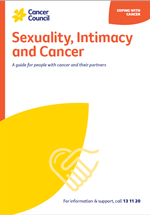- Home
- About Cancer
- Managing side effects
- Sexuality, intimacy and cancer
- Resuming sexual activity after treatment
- Adapting to changes
Adapting to changes
There are several ways to prepare for sex and intimacy changes during or after cancer treatment:
Talk openly with your partner
Share any concerns you have about having sex or being intimate. Tell them when you are ready to have sex, what level of intimacy and intensity you prefer, if they should do anything differently and how they can help you to feel pleasure. Some people have had a good sex life but have never spoken openly about it before. It can feel like it might be too awkward, and you might be tempted to avoid it, but having these talks can be helpful. Start with an easy topic and build up to the more difficult ones.
Ask your partner how they are feeling
They may be worried about hurting you or appearing too eager. Sometimes people avoid all contact because they don’t know how much touch is okay. You can help satisfy your partner by exploring what they want and what you are able to do.
Take it slowly
It may be easier to start with cuddles or a sensual massage, rather than penetrative sex. Talk about this before you start so you both know what the limits are. You can withdraw your consent at any time, even if you have already begun to have sex. Many people find that things often improve with communication, time and practice.
Plan ahead
You may need to plan when to have sex because of things like vaginal lubricants, erection devices, incontinence or stomas. Think about the timing of your medicines – some may reduce pain and make you feel more comfortable, or they might make you feel sleepy and not like being intimate.
Explore different ways to have sex
How you used to enjoy having sex may now be more difficult or not possible after cancer treatment. This can be upsetting, but most people can find satisfying new options. Keep an open mind about ways to feel sexual pleasure – you may want to explore different erogenous zones, such as the breasts, ears or thighs; mutual masturbation; oral sex; personal lubricants; vibrators and other sex toys; erotic images and stories; and sexual fantasies.
Focus on other aspects of your relationship
Many relationships do not depend on sex, and you may or may not see sex as being important. Either way, it can be helpful to talk about how you and your partner feel about your sex life, and work out any differences you may have.
Spend time together doing other things you both enjoy, which can also bring you closer. That way, sex isn’t the only way that you show your affection and share intimacy, and this can take any pressure off your sex life.
Try exploring your sexuality on your own
Touch and masturbation can help you to understand what has changed and what feels good in a way that you have complete control over. You can take your time to explore how your body reacts, without feeling any pressure to “perform” or to keep going if you don’t really want to. A vibrator or other sex toys may increase sensation and bring a sense of fun. Once you have begun to feel comfortable with exploring your body, you can show your partner what feels good and works best, what doesn’t work and what has changed.
Use relaxation and meditation techniques
Stress and anxiety can make it much harder to feel in the mood for intimacy. Making time for meditation or mindfulness may help you relax and stay in the moment with your partner. There are many free apps and podcasts that can guide you through learning relaxation techniques. Treatment centres often run programs where you can learn to meditate. Listen to our meditation and relaxation podcast below.
Seek assistance
Talk to any member of your health care team or ask your doctor for a referral to a sexual health physician, sex therapist or psychosexual counsellor to help you find solutions.
Max felt he was not the same man after treatment. He would avoid talking and touching. Counselling gave us ways to help express what was really going on.
Pat
→ READ MORE: Communicating with your partner
Podcast: Finding calm during cancer
Listen to more of our meditation and relaxation podcast
More resources
Dr Margaret McGrath, Head of Discipline: Occupational Therapy, Sydney School of Health Sciences, The University of Sydney, NSW; Yvette Adams, Consumer; Dr Kimberley Allison, Out with Cancer study, Western Sydney University, NSW; Andreea Ardeleanu, Mental Health Accredited Social Worker, Cancer Counselling Service, Canberra Health Service, ACT; Kate Barber, 13 11 20 Consultant, Cancer Council Victoria; Dr Kerrie Clover, Senior Clinical Psychologist, Psycho-Oncology Service, Calvary Mater Newcastle, NSW; Maree Grier, Senior Clinical Psychologist, Royal Brisbane and Women’s Hospital, QLD; Mark Jenkin, Consumer; Bronwyn Jennings, Gynaecology Oncology Clinical Nurse Consultant, Mater Health, QLD; Dr Rosalie Power, Out with Cancer study, Western Sydney University, NSW; Dr Margaret Redelman OAM, Medical Practitioner and Clinical Psychosexual Therapist, Sydney, NSW; Kerry Santoro, Prostate Cancer Specialist Nurse Consultant, Southern Adelaide Local Health Network, SA; Simone Sheridan, Sexual Health Nurse Consultant, Sexual Health Services – Austin Health, Royal Talbot Rehabilitation Centre, VIC; Prof Jane Ussher, Chair, Women’s Heath Psychology and Chief Investigator, Out with Cancer study, Western Sydney University, NSW; Paula Watt, Clinical Psychologist, WOMEN Centre, WA.
View the Cancer Council NSW editorial policy.
View all publications or call 13 11 20 for free printed copies.
Need to talk?
Support services
Coping with cancer?
Speak to a health professional or to someone who has been there, or find a support group or forum
Life after cancer treatment
Webinars, exercise and nutrition, sexuality programs, and back-to-work support
Cancer information
Your coping toolbox
Strategies for managing difficult situations during and after cancer treatment
View our publications
Guides and fact sheets for people with cancer, their families and friends

